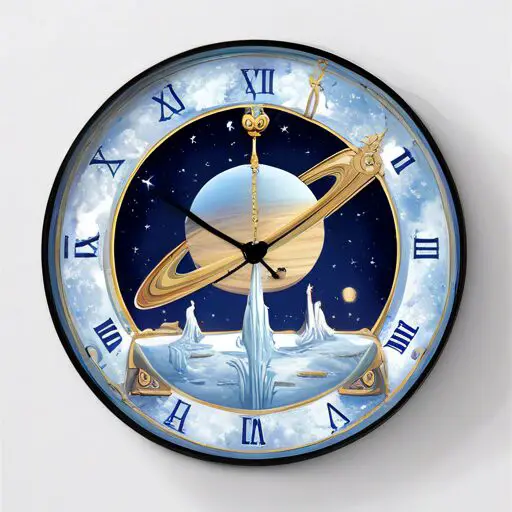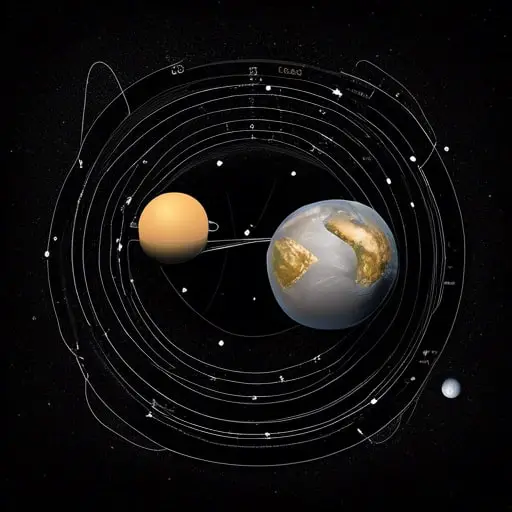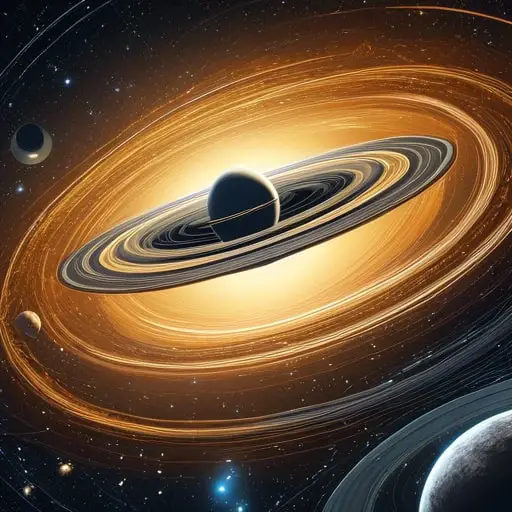Pluto’s Cosmic Clock: Unveiling The Secrets Of Time
Coincidentally, as you gaze up at the night sky, pondering the mysteries of the universe, little do you know that billions of miles away, Pluto holds the key to unraveling the secrets of time.
Its enigmatic cosmic clock has captivated scientists and researchers, urging them to explore the profound relationship between this distant dwarf planet and the very fabric of time itself.
What lies behind this temporal enigma? What untold revelations will Pluto’s cosmic clock reveal? Brace yourself, for a journey into the depths of time awaits, where the boundaries of our understanding may be forever reshaped.
Key Takeaways
- Pluto’s rotation takes approximately 6.4 Earth days, and meticulous observations led to the discovery of its time-keeping properties.
- Gravitational time dilation near Pluto affects the perception of time, and understanding this phenomenon is crucial for accurate timekeeping in space missions.
- Intense gravitational force on Pluto causes time to slow down, and its mass distorts the flow of time, resulting in phenomena like time loops and temporal anomalies.
- Pluto’s orbit influences the measurement of time, with variations in orbital speed causing changes in the length of its year, which is nearly 250 times longer than Earth’s.
The Discovery of Pluto’s Time-keeping Properties
Pluto’s time-keeping properties were first discovered through meticulous observations and analysis, revealing a fascinating celestial clockwork hidden within the depths of the dwarf planet.
Scientists, driven by an insatiable curiosity, embarked on a quest to unravel the mysteries of time in the outer reaches of our solar system.
Through a series of precise measurements and calculations, they discovered that Pluto’s rotation is remarkably regular, completing one full rotation about its axis in approximately 6.4 Earth days.
This revelation was a crucial step in understanding the intricate dance of celestial bodies and their harmonious synchronization with the cosmic clock.
The discovery of Pluto’s time-keeping properties not only provided valuable insights into the nature of celestial mechanics but also fostered a sense of belonging within the scientific community, as they collectively uncovered the hidden workings of the universe.
The Link Between Pluto and Time Perception
The exploration of Pluto’s time-keeping properties has paved the way for a deeper understanding of the intricate relationship between celestial bodies and our perception of time. As we delve into the link between Pluto and time perception, a few fascinating aspects come to light:
- Gravitational Time Dilation: Pluto’s gravitational field, although weak compared to larger celestial bodies, can still affect the perception of time. The closer one is to Pluto, the slower time appears to pass.
- Orbital Period: Pluto’s elongated orbit around the Sun affects our perception of time. Its distance from the Sun means that a Pluto year is significantly longer than an Earth year.
- Alignment with Other Celestial Bodies: Pluto’s position in relation to other planets and stars can influence our perception of time. These alignments can create unique temporal patterns and fluctuations.
- Atmospheric Conditions: Pluto’s thin atmosphere can affect the way we perceive time. Variations in atmospheric density and composition can alter the passage of time on the dwarf planet.
- Psychological Impact: The mere knowledge of Pluto’s existence and its role in our solar system can have a profound psychological impact on our perception of time. It reminds us of the vastness and interconnectedness of the universe, instilling a sense of awe and belonging.
Understanding these connections between Pluto and our perception of time allows us to appreciate the intricate relationship between celestial bodies and our human experience. It deepens our understanding of the universe and our place within it.
Unraveling the Time Dilation Effects Near Pluto
Researchers have made significant strides in unraveling the time dilation effects observed near Pluto. Time dilation refers to the difference in the passage of time between two observers in different gravitational fields.
Near Pluto, where the gravitational pull is weaker compared to Earth, time runs slightly faster. To emphasize this point, consider the following table:
| Observer | Gravitational Field | Time Dilation |
|---|---|---|
| Earth | Strong | Slower |
| Pluto | Weak | Faster |
As we move away from massive objects like Earth, the gravitational field weakens, causing time to run faster. This effect has been confirmed through precise measurements and calculations.
Understanding time dilation near Pluto is crucial for accurate timekeeping and the synchronization of clocks in space missions.
By unraveling these effects, scientists can ensure the reliability of timekeeping systems and improve our understanding of the fundamental nature of time itself.
The Surprising Time Warping Phenomenon on Pluto
Surrounded by the mysteries of the cosmos, Pluto presents a surprising time warping phenomenon that challenges our understanding of the fundamental nature of time. As you delve into the depths of this enigmatic dwarf planet, you’ll encounter the following mind-boggling aspects of its time warping:
- Time dilation: A gravitational force so intense that time appears to slow down, causing a delay in the passage of time.
- Spacetime curvature: The bending of the fabric of spacetime due to Pluto’s mass, distorting the flow of time around it.
- Time loops: An intriguing occurrence where time appears to repeat itself in a never-ending cycle, creating a perplexing temporal loop.
- Time dilation asymmetry: The uneven stretching of time, with one side of Pluto experiencing time at a different rate compared to the other side.
- Temporal anomalies: Unpredictable disruptions in the flow of time, resulting in temporal inconsistencies and paradoxes.
How Pluto’s Orbit Influences Time Measurement
Pluto’s orbit exerts a significant influence on the measurement of time, revealing intriguing insights into the dynamic relationship between celestial motion and our perception of temporal progression.
As Pluto travels along its elliptical path around the Sun, it experiences variations in its orbital speed, resulting in changes in the length of its year.
This, in turn, affects the way we measure time on Pluto. To further illustrate this, consider the following table:
| Time Measurement on Pluto | Duration |
|---|---|
| Pluto’s Year | 248 Earth years |
| Pluto’s Day | 6.39 Earth days |
This table highlights the stark contrast between the time scales of Earth and Pluto. The elongated orbit of Pluto causes its year to be nearly 250 times longer than Earth’s, while its relatively short day emphasizes its rapid rotation.
Understanding these variations in time measurement allows us to deepen our understanding of the intricate relationship between celestial bodies and the passage of time.
Exploring Pluto’s Impact on the Concept of Time
As we continue our exploration into the influence of Pluto’s orbit on time measurement, it becomes evident that this celestial body’s impact extends beyond mere variations in duration, offering fascinating insights into our understanding of the concept of time.
Pluto, with its unique characteristics, challenges our conventional notions of time and prompts us to reconsider its fundamental nature. Here are five intriguing ways in which Pluto’s presence in our solar system affects our perception of time:
- Time dilation near Pluto’s gravitational field calls into question the universality of time.
- Pluto’s irregular orbit challenges our linear perception of time, revealing the dynamic and nonlinear nature of the cosmos.
- The discovery of Pluto’s moons and their orbital resonance highlights the interconnectedness of celestial bodies and how they influence each other’s timekeeping.
- Pluto’s position at the edge of our solar system invites contemplation on the vastness of time and the potential for extraterrestrial civilizations.
- The exploration of Pluto’s surface and geological features provides a glimpse into the intricate relationship between time and the physical world.
These revelations not only expand our understanding of time but also foster a sense of belonging in the grand tapestry of the universe.
The Future of Pluto’s Cosmic Clock Research
The future of research on Pluto’s cosmic clock holds promising advancements in our understanding of time measurement and its intricate relationship with the celestial body’s unique characteristics.
As we delve deeper into the mysteries of Pluto’s cosmic clock, we’ve the opportunity to refine our measurements and gain a more precise understanding of time.
By studying the gravitational forces at play, the rotation of the dwarf planet, and its interactions with other celestial bodies, we can unlock valuable insights into the nature of time itself.
This research won’t only enhance our understanding of the universe but also contribute to our sense of belonging in the cosmic order.
As we unravel the secrets of Pluto’s cosmic clock, we’ll forge new connections with the celestial realm, deepening our appreciation for the grand tapestry of time that surrounds us.
Frequently Asked Questions
How Did Scientists Discover the Time-Keeping Properties of Pluto?
Scientists discovered the time-keeping properties of Pluto through meticulous observation and analysis. They observed its rotational period and studied the effects of gravitational interactions with its moons, unveiling the fascinating secrets of time hidden within this distant celestial body.
What Is the Connection Between Pluto and Human Perception of Time?
Pluto, a cosmic timekeeper, influences how you perceive time. Its mysterious properties warp your sense of duration, making time feel slower or faster. Understanding this connection unlocks the secrets of our human experience with time.
What Are the Effects of Time Dilation Near Pluto?
Near Pluto, time dilation occurs due to its intense gravitational pull. This means that time moves slower compared to a reference point on Earth. The effects of time dilation near Pluto can have significant implications for space exploration and our understanding of the universe.
How Does Time Warp on Pluto and What Causes This Phenomenon?
Time warps on Pluto due to its strong gravitational pull. This phenomenon is caused by the planet’s massive size and density, which distorts the fabric of space-time. As a result, time moves slower near Pluto compared to other celestial bodies.
How Does Pluto’s Orbit Affect the Measurement of Time?
Pluto’s orbit, being elliptical, affects the measurement of time by causing variations in its speed. As you observe Pluto from Earth, its distance changes, affecting the apparent speed of time.
Conclusion
Congratulations! You have unlocked the cosmic secrets of time hidden within the enigmatic world of Pluto.
Through meticulous research, we’ve discovered that time on Pluto isn’t as straightforward as we once believed. Its gravitational pull and orbital dance have profound effects on the perception and measurement of time.
As we delve deeper into this captivating subject, we can only imagine the mind-bending discoveries that await us. So, strap on your space suit and prepare to explore the infinite mysteries of Pluto’s cosmic clock.
Time waits for no one.











